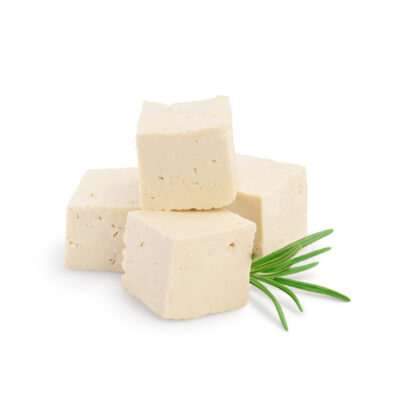Is Tofu Good for Diabetes? Benefits, Nutrition and Glycemic Index
Tofu is a soybean-based food that can be used in both savory and sweet dishes. Tofu is a great source of plant-based protein, iron, calcium, and other nutrients. Find out if it is good for diabetes.

Bean curd, or tofu, is coagulated soy milk, a soybean-based liquid. It is a soy-based food that is high in protein and low in calories.
After being soaked in water, soybeans are ground. After removing the soy milk from the mixture, calcium salts are added as a coagulant to give the tofu its solid consistency.
Tofu is a good option for vegans because it is not made from animal products.
Is Tofu Good for Diabetes?
Yes, tofu can be included in a diabetes diet. According to a study, tofu improves the sensitivity of tissues and organs to insulin, which helps to manage blood sugar levels and minimize insulin resistance in people with type 2 diabetes.
It also boosts insulin production and improves the functioning of insulin in people with other types of diabetes mellitus.
Not only this, changing your dietary patterns by including tofu and other healthy foods may help to prevent and control type 2 diabetes.
Does Tofu Affect Blood Sugars?
Tofu does not negatively impact your blood sugar levels. Tofu is rich in protein, which is known to have a very minimal effect on blood sugars with adequate insulin. Protein tends to slow down the absorption of sugars and carbohydrates, which helps to balance blood sugar levels.
It has a gradual effect on blood glucose levels over a few hours because it converts to glucose more slowly than carbohydrates.
Thank you for your answer
Health Reporter Surveys
Varieties of Tofu
Tofu is primarily divided into four varieties based on its water content and texture:
- Extra-firm tofu: Extra-firm tofu contains very little water. It is very simple to slice and holds its shape well. It is mostly used for pan frying and stir-frying.
- Firm tofu: This variety of tofu contains a little more water content than extra-firm tofu. It can be cooked in a pan or crumbled. You can gently press firm tofu to squeeze out any extra water.
- Soft tofu: The least pressed tofu is soft tofu, which also contains a lot of water. It can be used in both savory and sweet dishes due to its lighter texture. Because there is a lot of water in this kind of tofu, it should be handled gently and not be pressed any further to get rid of the water.
- Silken tofu: Silken tofu has a pudding-like consistency and is unpressed. You can consume it raw or pureed.
7 Health Benefits of Tofu
In addition to being a great vegetarian or vegan meat substitute, tofu has several advantages for your heart, bones, etc. Here are a few interesting health advantages of tofu:
#1 Reduces the risk of heart disease
Tofu’s combination of fiber, protein, and soy isoflavones may contribute to its heart-healthy benefits. This combination could also explain why whole soy foods like tofu appear to be more beneficial for decreasing cholesterol levels than soy supplements.
For instance, a 2020 study indicated that both men and women may experience a reduced risk of heart disease by eating a diet high in soy products, such as tofu.
Another study found that people who eat tofu more than once a week had a lower risk of heart disease by 18% than those who ate soy less frequently.
Not all soy foods, however, were beneficial. For instance, soy milk did not appear to change the overall risk. However, researchers concluded that soy products, such as tofu, could be incorporated into a diet to prevent heart disease.
#2 Aids in weight loss
Diabetes is more likely to develop in those who are obese. In comparison to people who are at a healthy weight, obese people have a roughly six-fold increased risk of developing type 2 diabetes. So, it is important for you to maintain a healthy weight.
Regularly eating tofu lowers the risk of weight gain. As it is a high-protein, low-calorie item that may help you feel satiated for longer and eat fewer meals over time.
According to a study, soy isoflavones and proteins may help prevent obesity. Consuming soy protein lowers plasma cholesterol and triglycerides while also reducing body weight and fat mass.
#3 May help prevent osteoporosis
Some studies suggest that soy foods can aid in the prevention of osteoporosis. By reducing bone resorption and promoting bone formation, soy consumption may help prevent bone loss brought on by menopause, according to epidemiologic studies conducted by researchers.
But they concluded that further information is required because the connection is still not evident.
#4 Associated with a lower risk of some cancers
Including tofu in your diet could also lower your risk of developing some cancers.
Breast cancer
According to a 2018 study, women who eat a soy-rich diet could be less likely to die after a breast cancer diagnosis than those who eat very little soy.
Furthermore, postmenopausal women who eat a soy-rich diet before and after a breast cancer diagnosis may be less likely to have their cancer relapse once it is in remission.
Other types of cancer
A soy-rich diet may also help reduce your chance of developing other cancers, such as endometrial, colon, prostate, and stomach cancer.
Participants who consumed the most dietary soy isoflavones had a 10% reduced risk of mortality than those who consumed the least.
Men who regularly consume soy-rich foods such as tofu may have a lower risk of prostate cancer. However, further research is required before any recommendations can be provided.
#5 Diabetes risk may be reduced
Type 2 diabetes incidence is inversely correlated with dietary intake of tofu, soy protein, and isoflavones. According to 2020 research, increasing the consumption of some soy products can help prevent type 2 diabetes.
According to another study, soy protein consumption also improved glucose homeostasis parameters in women with gestational diabetes mellitus.
#6 Pain relief during menopause
Soy products like tofu may be able to lessen the frequent hot flashes associated with menopause. Additionally, a 2017 study found that soy isoflavones may be beneficial for treating both the physical and psychological symptoms that women commonly suffer throughout the entire perimenopausal period.
#7 Rich in calcium
Calcium is essential for maintaining healthy bones. Most of the calcium in your body is utilized to support the growth and good health of your bones and teeth. Calcium is the mineral that is most prevalent in the human body.
Brittle bones that are more prone to disease and fractures can be caused by a diet low in calcium.
For adults aged 19–50, a daily calcium intake of 2,500mg is advised. The daily limit for people 51 and older is 2,000mg. Tofu has a lot of calcium. Each 126g serving has about 861mg of calcium.
Nutritional Value of Tofu

Carbs
Tofu is a low-carbohydrate food. A half-cup portion contains only 3.5 grams of carbs, the majority of which are fiber. The amount of fiber in half a cup serving is 2.9 grams.
Fats
Even though a half-cup serving of firm tofu has about 11 grams of fat, the majority of that fat is good for your heart. 6.4 grams of polyunsaturated fat and 2.4 grams of monounsaturated fat are both present in tofu. A serving of firm tofu contains about 1.6 grams of saturated fat.
Protein
With roughly 22 grams of soy protein per serving, tofu is a fantastic source of protein. Tofu can be used in place of meat in recipes because it is a complete protein. Tofu is frequently used as the primary protein in meals by those who avoid meat.
Minerals and vitamins
A good source of calcium, firm tofu made with calcium sulfate provides 858mg or 66% of the recommended requirement for calcium (DV). In addition, firm tofu is a good source of selenium and manganese. It is a top-notch copper source as well.
In terms of iron, phosphate, zinc, and magnesium, tofu is a decent supply.
Calories
Tofu contains a variety of calories, although a half-cup meal of firm tofu has roughly 181 calories. 100g of it provides roughly 144 calories. A 100-gram serving of silken tofu probably has 55 calories in it.
Tofu Glycemic Index
The glycemic index of tofu is 15. That means that it is a low glycemic index food. Foods with a low glycemic index take longer to digest and absorb and helps to regulate blood sugar levels.
Risk Factors
Eating tofu can be a healthy alternative to meat products. However, there is still debate over some of its health benefits.
#1 Risks of processing
Animal research also indicates that the amount of processing an isoflavone-containing product has undergone affects the probability of tumor development.
Tofu-based products, such as tofu sausages, may contain unhealthy additives such as sodium and other preservatives. It is recommended to read the labels before purchasing tofu.
#2 Genetically modified
Soy products are frequently genetically engineered (GM). It is possible to process soy products using hexane, a solvent that is used to extract oil from soybeans.
Those worried about hexane processing or genetic alteration may find organic food to be a good alternative.
Rather than relying on one food item, the key to good health is a healthy lifestyle that includes a varied and balanced diet and frequent exercise.
A Word From MD
People who follow a vegan diet can acquire enough protein from tofu. According to the American Diabetes Association (ADA), plant-based proteins are one of the healthiest options for people with diabetes as they include a good balance of proteins, fats, and fiber.
In people with type 2 diabetes, a high-protein diet decreases postprandial blood glucose levels and enhances overall glucose regulation.
Dietary soy helps in maintaining cholesterol and sugar levels stable. However, soy products also vary and may contain a relatively high carb content (soybean sprouts), so you should evaluate each case separately.
Even though eating tofu has been deemed nutritious, you shouldn’t consume a lot of it. Tofu contains significant levels of phytoestrogen, which can disrupt your hormonal balance by interacting with your estrogen.
Therefore, while not going beyond, tofu is healthy and safe for diabetes patients.
Conclusion
Tofu is a good source of plant proteins that will provide you with vital nutrients and may lower your risk of developing significant medical diseases like anemia, heart disease, and diabetes.
People who regularly eat soy foods like tofu have lower LDL cholesterol levels.
Since it absorbs flavors that go well with practically any dish, cooking it is also incredibly simple. For people with diabetes, taking tofu coupled with healthy foods is advantageous.

















































 Select your language:
Select your language: 








